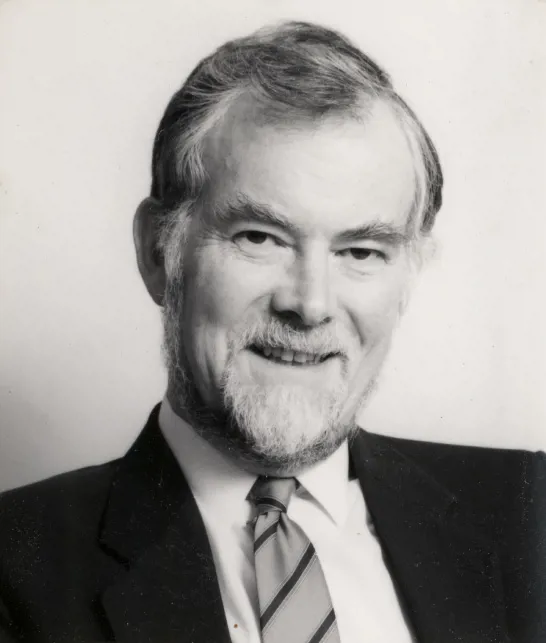Peter Foyer
Published: Fri 9 Jun 2023
Published: Fri 9 Jun 2023
Peter Foyer was born in Coventry in 1938 to parents Irmgard and Rudolf Feuerberg (who later changed his name to Randolf Foyer). Peter has one younger brother, Ron, who has lived in Calgary, Canada for much of his life.
The family moved to Solihull in 1946 where Peter and Ron attended Solihull School until aged 18. While there, it was a Boys only school with a 6-day school week. Tuesday and Saturday afternoons were for sports and Thursday afternoons were for Army, Naval or Air Force cadets.
His interest in Engineering showed at a young age, especially in Transportation. His Dad had a workshop in their house which had, at least, a lathe and soldering equipment. Together they built engines and rail cars. They also built an O Guage railway track in the back garden. It included a hill with a tunnel going through it.
To Peter’s brother’s knowledge, none of the trains they built ever ran on the track. Their interest was in building the rolling stock.

He went to Nottingham University and studied Mechanical Engineering on a State Scholarship - the highest level of Government scholarship, based on his academic skills. He graduated in 1959.
His first job after leaving University was with the Rootes Group in Coventry as a graduate apprentice. Then he went to Rootes Group in Luton as an Engineer. Rootes was a major UK car and truck company in the UK then with popular brands like Hillman, Humber, Singer, Sunbeam, Talbot, Commer and Karrier, now all gone.
Peter worked on the Hillman cars and Commer trucks. He became the Production Control Manager there. Part of his work involved the Rootes plant in Scotland, where he began a long-time interest in Casting, Forging and Presswork.
While there he took a Production Technology course at Cranfield College, now Cranfield University. He had his first exposure to computers there as well an introduction to the business of Commercial vehicles.
Rootes was taken over by Chrysler but the brands didn’t survive. Peter thought this was due to Chrysler’s failure to understand why Rootes had been successful.
Then in 1965 went to work for GKN as an Engineering Consultant and stayed there until 1970. His work was on Production Engineering, Production Management, Temporary Management and Contract Planning.
He was shocked by many of the very old processes used, though they did have an Industrial Robot. Wherever Peter went he gained new knowledge. How to do things well and how not to do things. At GKN it was most of the latter - lack of focus, investment shy, weak skills and a ‘Dead’ culture.
He then moved on to the then PE Consulting Group as an Engineering Consultant in Egham with much enthusiasm. Their major clients included British Steel and London Transport.
Then went to work for a consulting company called ICFC in London. This didn’t last long, and he moved to Covrad Ltd, close to home in Coventry.
His reflections on the Engineering Consulting businesses he had worked at were not complimentary. In his opinion, among their failings were:
In 1975 went to Ingersoll Engineers based in Daventry. Stayed there for 16 years until 1991. This consulting work took him around the world to most countries in Europe as well as the USA, Canada and Australia.
This was a consulting firm he really liked:
Among his clients were
His other reflections on Ingersoll included.
He was concerned about the control by the accountants and the greater interest in Management Consulting. He was pleased that later Ingersoll moved into good hands.
After leaving them, he became the visiting Professor of Engineering Design at Coventry University and Director of Peter Foyer Consulting Engineers Ltd. Professor title negotiated between Ingersol Engineers and the Royal Academy of Engineering.
One of Peter’s lifelong professional projects was `Truck Train` which ran from 1977 to 2018 with Philip Mortimer and The University of Coventry. Its intent was to have freight trains travel as passenger train speeds
He was a member of the Institute of Engineering and Technology since 1963 and was made a Fellow in 1986. He was a visiting Professor at the University of Coventry and, until quite recently, oversaw a number of PhD students. Teaching and mentoring students was a role that he was passionate about.
He was also an active volunteer with the Prince of Wales Achievement awards.
Peter Foyer, British manufacturing and electrical engineer. Chartered engineer Cranfield University, 1993.
Fellow Institute Electrical Engineers (council 1994-1996); member Institute Operations Management.
Consultant PE Consultant Group, Ltd., London, 1970-1972.
Chief industrial engineer Covrad Ltd., Coventry, 1972-1974.
Consultant 3i's, London, 1974-1975.
Senior consultant Ingersoll Engineers Ltd., Warwickshire, United Kingdom, 1975-1991.
Director Peter Foyer Consultant Engineers Ltd., United Kingdom, since 1991.
Royal Academy Engineering visiting professor Coventry University, since 1991.
Panellist Prince of Wales award for industry, London.